#misadventures in computer programming
Explore tagged Tumblr posts
Text
FOR THE LOVE OF ALL THINGS FLUFFY!!!!
I’m planning the timing/route for tomorrow’s regularly scheduled trip to the vet. This lovely adventure will take at least two hours one way minus added traffic, accidents, or road construction. So not only do I have to use a calendar for the date and time of the appointment, a mapping app to figure out the route….
But then I have to go scour MODOT as well because in this day and age no one has figured out how to put the option of avoiding construction in a mapping app!!! You can avoid highways and tolls and ferries…. But for the love of all things fluffy the people who program maps obviously do not drive or they would understand the need to avoid construction zones!!! Nothing like going from 70mph to 15mph or less…
(Can’t wait for my doctor visit next week and the 70/63 interchange. Should be so much fun!)
#bunny#rabbit#service animal#house rabbit society#rabbits#albert adventures#albert bunstein#driving#constuction#apple maps#google maps#MODOT#misadventures in computer programming
8 notes
·
View notes
Text
okay that was a mistake, i'm just gonna watch it on youtube :/
I FOUND THE TOHRI ROUTE AND I CAN FINALLY PLAY IT
#nico's hatoful boyfriend misadventures#please let my computer not die right now the program i downloaded to open the tohri file won't delete
2 notes
·
View notes
Note
I am still so confused about the ai situation with misadventures smp. Is it good? Is it bad? All I know is that these stupid npcs left a sour taste in my mouth XP
So from what we know at this point in time, it's basically a handcrafted Language Model (Generative AI) that is probably trained on non-stolen texts. (Martyn said the developers were writing for it, so I'm assuming they were writing the training data themselves)
The parts that are still pretty unclear is what kind of computing power is used (environmental concerns) (though, the size of the AI is probably not that big, so I would not be too worried about this?? (maybe idk)) and Martyn mentioned the Google Translate Cloud at some point, which both could still raise ethical questions
I wasn't really planning on watching the SMP to begin with (coincidentally because I'm too busy with my AI bachelor's program lol) but please do feel free to draw your own conclusions. There's still quite a lot we don't know, so it's really up to the individual viewer whether they're willing to give them the benefit of the doubt until we know more
10 notes
·
View notes
Text

Bowing to Reality
When I was young, I tried to escape the madness of my world by imagining a better future. Now that I'm old, I seek that refuge in nostalgic memories of the past. It still doesn't work. I can dwell in the present for hours on end while practicing meditation, but when I turn on the evening news I just want to cry. How pathetic we are... how laughable... we sing about the angels, but we are programmed with the law of the jungle.
I wonder how many of us would be content to just earn a decent living, raise a family, and give our kids a good education? Most of us, I think... but throughout all of history we have been cursed with a ruling class that is never content... never satisfied! No matter how much we give them, it is never enough.
In colonial America, we fought a revolution to escape that sort of tyranny... but then we turned around and stole an entire continent from its native inhabitants. It seems to me our revolution was a fraud... we merely replaced a royal aristocracy with a corporate aristocracy based on tobacco, alcohol, cotton, and slave labor. We threw the King's tea into Boston Harbor, and then picked a president who used slaves to brew Rye Whiskey. Our founding fathers were so proud of their drug trade that they decorated the Capitol Dome with tobacco leaves.
Somehow our Christian forbears convinced themselves that their genocidal transgressions were God's gift of 'Manifest Destiny'. Not even Donald Trump could have imagined such a scam! We signed treaties with the Cherokee, Choctaw, and Seminoles, and then marched them off to die on the Trail of Tears. Some of us took asylum in Texas and then stole it from Mexico. We pretended to fight a Civil War to emancipate the slaves, but only gave free black men a fifth of a vote! Then we allowed Jim Crow slavery to flourish for centuries. Our wives didn't even get a fifth of a vote until 1917.
We created puppet dictators in Central America to enslave the native 'Indios' so our corporations could grow cheap bananas, sugar cane, and pineapple. Those illegal Indios are still harvesting our fruits and vegetables in the Imperial Valley even as Trump plans to deport them. And what has all that hypocrisy accomplished for us? Unsurprisingly, we have all become the economic slaves of a few elite families holding 90% of all the wealth in the world. And yet we go on telling ourselves that we live in a democracy where all men are created equal!
And how many American boys and girls have been sacrificed on that altar of false freedom? In 1917, we killed 116,000 of them in a war between Queen Victoria's relatives because one of Kaiser Wilhelm's submarines sank one of George V's ocean liners that had some Americans on board. In 1941, Roosevelt got the Japanese to attack Pearl Harbor so he could declare war on Germany over the objections of America's isolationist majority. That war killed over 400,000 Americans, including my dad. In the 1970s, we killed fifty thousand more American boys while losing a war with Vietnam, and fifteen years later our corporations were making bluejeans and computer chips on those very same killing fields. In 1992, we gave Saddam Hussein chemical weapons to kill his Iranian enemies, and in 2006 we killed him over weapons of mass destruction that didn't exist. That Iraqi meddling cost us a trillion dollars and thousands of lives over a period of twenty-five years.
So many misadventures... there were the Philippines, and Israel, and Samoa, and Diego Garcia, and Afghanistan, and Lebanon, and Panama, and Cuba, and Sudan, and Yemen, and The Congo, and Nigeria, and Nicaragua, and Cambodia, and Korea. Oh, don't forget Korea... 36,000 dead Americans there, and another 24,000 guarding that no man's land to this day. And remember the Marshall Islands? No? Well, we claimed that territory after WWII without bothering to consult the native islanders. And how did we treat them? Well we removed the entire populations of Bikini and Enewetok so that we could test our atomic bombs on their Polynesian paradise. That's American democracy for you.
And despite all that death and destruction, America has not actually won a war since 1945. Only America's corporations can be said to win wars. They profit even when we surrender. Today, you and I are paying withering taxes so that America can maintain over 600 military bases around the world, and the military industrial complex pockets it all: $895 Billion more scheduled for 2025. Think what America would look like if we spent that on education!
And what is the corporatocracy planning for us now? They are being subsidized by our taxes yet again to build giant computer centers that will house an Artificial Intelligence Network so superior to our human networks that we will have absolutely no ability to resist our enslavement. Elon Musk predicts that our streets will be full of self-driving cars within two years, and shortly afterward our homes will be full of R2-D2 and C-3PO style humanoid robots. He predicts that these robots will become the defining product of our time, with each human owning several, and industry employing billions. And with so many robots building our world and doing our work, we won't need to earn money anymore. So much wealth will be generated that every human will have a universal basic income, and humanity's standard of living will surge beyond our wildest dreams. Well... certainly Elon's wealth will surge, but I'm not so sure about the homeless folks sleeping in the streets!
And because the robots will be smarter, faster, and stronger than us, Elon foresees humanity living in 'retirement'. Any activities we take up at that point will be in the nature of hobbies. We won't need to work anymore because it will be so much easier to tell the robots to do it. And you won't even need to speak your commands aloud. You won't even need a remote control. Musk is working on Neuralink Technology to connect those computer devices directly into your brain. Three human test subjects are already connected. So... if you really want to match wits with the robots, you will just need to use Elon's Neuralink so that your brain cells can tap into the robot's super-intelligence. Won't that be fun?
And there is yet more... Musk expects to send the first robot-crewed spacecraft to Mars in two years, with human-crewed ships to follow soon after. His goal is to build a self-sustaining colony on Mars, so that if some catastrophe wipes out humanity on Earth, our species will still survive. Of course, this begs the question; if robots are so superior, why bother to save a human? In fact, the most likely catastrophe on Earth will be the Armageddon brought on by robotic warfare. Every military on Earth is even now building AI and robotics into their weapons of war.
Back in 1942, Isaac Asimov published his famous 'Three Laws of Robotics'.
First Law: A robot cannot injure a human or allow a human to come to harm.
Second Law: A robot must obey human orders, unless those orders conflict with the First Law.
Third Law: A robot must protect itself, unless that protection conflicts with the First or Second Law.
One wonders how Asimov ever came up with such a ludicrous scenario. In a world ruled by Vladimir Putin, Xi Jinping, Ali Khamenei, Benjamin Netanyahu, Kim Jong Un, Elon Musk, and Donald Trump, our robots will never be programmed with compassion. Like their makers, our robots will be programmed with the unvarnished law of the jungle. As I said... when I turn on the evening news, I just want to cry.
Not all who wander are lost,
༺ Ŧoƞpa Ɉoƞ
19 notes
·
View notes
Text
Ed's TRON 2.0 AU
Also known as Ed's misadventures in the Grid
so... This idea came up in an RP, and I kinda like it? Idk. Some day I will give Ed something to be happy about in his backstory, but that day is not today.
Any way a big part of Ed's background is that his father threatened to kidnap him if he refused to work for Sr. But what if SR didn't threaten?
The thing is, he paid for Ed's college education expecting Ed to work for fCon when he graduated. Instead, Ed essentially cut ties and went to go work for fCons largest competitor. At first, he gave Ed the option to be a corporate spy, but when it becomes clear Ed has no interest in that, he figured if Ed won't be useful, he might as well make him useful... by letting him be the first (second after Thorne???) test subject for fCon's attempt at the digitization technology.
Regardless, if Dillinger Sr. kidnapped him, at this point in Ed's life, he's been at Encom a short enough time and holds a position low enough that nobody would really bat an eye at his disappearance beyond the necessary paperwork to hire someone to replace him.
There are SO MANY ways this could go.
If he's the first, before they realized they needed Ma3a (YORI??? WHAT HAPPENED TO YORI? FUCK IT IN THIS VERSION IT'S YORI IF NOT BOTH), Ed likely gets corrupted and is trapped as such in the computer. Unless someone (Lora?) with experience with the laser finds him and recruits probably a whole hospital's worth of doctors to help restore him, he's likely to just... haunt the system as a user-program eldritch horror. There's a lot of fun themes about what it is to be human that could be explored here.
If fCon got a hold of Yori, he could either be kidnapped and digitized in addition to, or instead of Alan.
If it's instead of Alan, there's very little chance of anyone realizing what happened. Dillinger Sr. would very likely try to contain Ed, and maybe for a while he would succeed, but eventually Ed, determined not to end up in the situation he'd grown up in again, would manage to escape containment. Even then, the chances of returning to the other side of the screen are uncertain. More likely, he just wanders around the system, maybe he ends up staying to cause chaos on fCon's server, maybe he tries to get back to Encom to just live out the rest of his life as a digital being. Maybe Yori finds him and helps him get out once they both get back to Encom's server.
If Alan is also kidnapped and the events of 2.0 play out, then it's possible Jet may find him and they could escape together. This could be either the beginning of a very strong friendship or bitter rivalry. Either way, this scenario is the one where he's most likely to escape back to the other side of the screen.
There are several end scenarios in the event that Ed does make it back, regardless of the path it took to get there.
The fist is the status quo remains (mostly) unchanged. Ed goes back to working for Encom, he files for a restraining order on his father, maybe he's friends with Alan and Jet, maybe he's not. He knows what fCon is up to, and is quietly trying to foil the rest of their plans with Alan and Jet.
OR...
Dillinger Sr. catches wind that they're about to escape and arrives just after they've made it back to the other side. That mishap that happened to Lora in the 2.0 timeline? It doesn't happen to Lora. Maybe it's a mishap, maybe it's not, but the laser fires, and Dillinger Sr. is caught in it. Maybe Dillinger Sr. is corrupted, maybe he's not. regardless, he's put on a portable storage device. There's a chance that fCon crumbles once Dillinger Sr. is gone, but if it doesn't, it's no longer the Evil Corperation of Evil any more. Just another competitor. Ed keeps the portable drive locked in a desk drawer or firebox, labeled clearly DO NOT OPEN. Ed sleeps a little easier, though he still fears someone getting ahold of the drive and unwittingly freeing Dillinger Sr.
OR...
The laser misfires. When the local authorities arrive and Ed, Alan, and Jet give their statements, there are no charges. It was an accident, or it was self defense, though it may take a while to convince everyone when Dillinger Sr.'s death hits the news.
Ed is finally safe and his father will never be able to control him again, but it will be a while before Ed can sleep without dreaming of his father's charred remains.
2 notes
·
View notes
Text
Week 9: Two Sitcoms and a Movie

After eight straight weeks of new episodes, both The WB and UPN take a break for the first time following the end of February sweeps. Voyager and all of the WB shows aired reruns this week, so all we have left are the two UPN sitcoms and a TV movie that UPN aired in place of its usual Tuesday slate.
This is part of a project where I watch The WB and UPN on a 30 year delay. This is crossposted from my website, where you can find an interactive schedule for both networks, including where you can watch these shows today.
Monday March 6, 1995 Star Trek: Voyager S1E04: "Time and Again" - 8 PM on UPN Platypus Man E07: "Lou's the Boss" - 9 PM on UPN
I thought the B-plot of various bar patrons trying to stump Paige with sports trivia worked well [1], but was more mixed on the A-plot with Richard and Lou feuding after Richard hires his latest girlfriend on his show.
Pig Sty E07: "Party!!!" - 9:30 PM on UPN
Nothing particularly notable about this week's Pig Sty, where the roommates host a party to try to cheer up P.J. Everyone continues to kind of suck, with the best gag of the episode being Cal misadventures trying to barbecue in the middle of the New York City winter, and I think a lot of the appeal there is just seeing Cal suffer, since he sucks the most.
Tuesday March 7, 1995 Movie: "The Shamrock Conspiracy (1995)" - 8 PM on UPN
While the sitcoms were their typical mediocrity, I thought the movie that UPN aired in place of Marker and The Watcher was actually pretty good, at least for a thirty-year-old made-for-TV film.
The Shamrock Conspiracy follows retired Scotland Yard inspector Teddy Harrison (Edward Woodward) who visits his somewhat-estranged daughter (Elizabeth Hurley) in New York City and winds up helping his future son-in-law (Jeffrey Nordling), a media liaison officer for the NYPD, solve a case.
Teddy is definitely the strongest part of this movie, with his various (mis)adventures whenever he wanders around the city on his own working very well. My biggest complaint would be that the action in the climatic chase at the end was hard to follow given how dark it was, but I think that had more to do with the VHS-quality taping I watched [2].
Speaking of the tape I watched, it includes the commercials that aired as part of WWOR-TV's [3] broadcast, which was a nice way to put this whole project in better context of the time. I got some of the 1995's best car, cleaning product and over-the-counter pharmaceutical commercials as well as a preview for the station's 10 o'clock newscast that promised to talk about New York reinstating the death penalty [4] and Wonderbra swimsuits. There were also a couple of confusing promos for Marker that were weirdly computer themed [5], which I can't imagine helped the show find lasting viewers.
Wednesday March 8, 1995 The Wayans Bros. S1E02: "First Class" - 8 PM on The WB The Parent 'Hood S1E01: "Ring Around the Nosey" - 8:30 PM on The WB Unhappily Ever After S1E02: "Gift of the Magnovox" - 9 PM on The WB Muscle: "Episode 1" - 9:30 PM on The WB
Next week, we're back to a full slate of programming, including the second of the two episodes of The Watcher that I've been able to find.
One additional note: I'll be traveling for most of April, so I plan to watch ahead these next few weeks and pre-write recaps so that I don't need to watch or write anything while on my trip. This shouldn't affect anything on your end, as posts will still be scheduled to go up each Monday at noon as usual, but if something happens in the next month and a half of 2025 that's relevant to my 1995 TV watching and I don't reference it here, that's why.
------------------------------------------------------------------------------
Especially the ultimate punchline of the guy actually wanting a date with Tommy, not Paige. I would expect a joke like this to be done in a super homophobic way in 1995, but it actually wasn't at all. ↩
It's on YouTube, linked in the interactive schedule if you're curious. The YouTube video is 2.5 hours long, but the last half hour is an unrelated partial recording that was presumably taped over. ↩
UPN's New York-based flagship station. ↩
No one was executed under it, and this statute was ultimately ruled unconstitutional in 2004. ↩
I think they were trying to make a connection between surfing the web and surfing waves? ↩
0 notes
Text
"TVparty!" by Billy Ingram (1998)
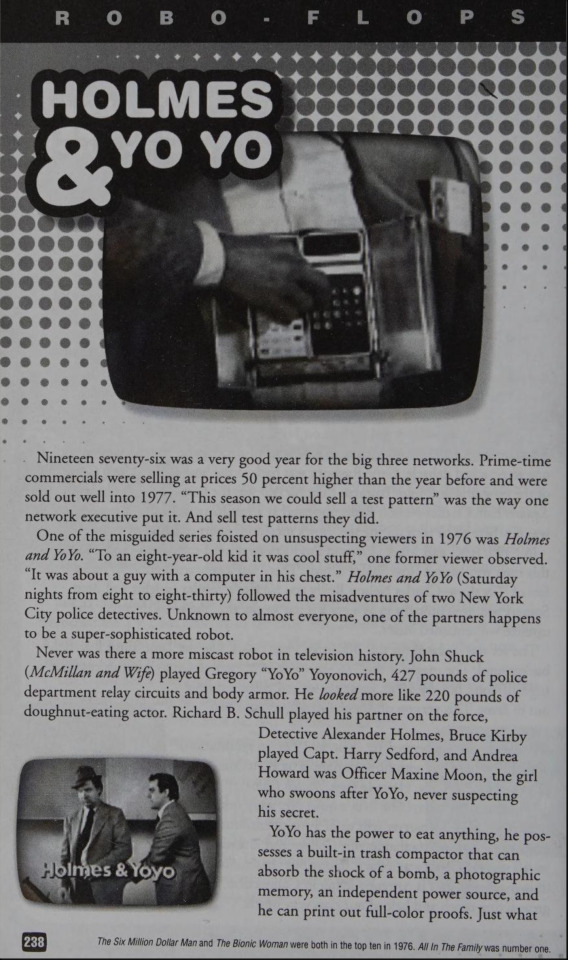
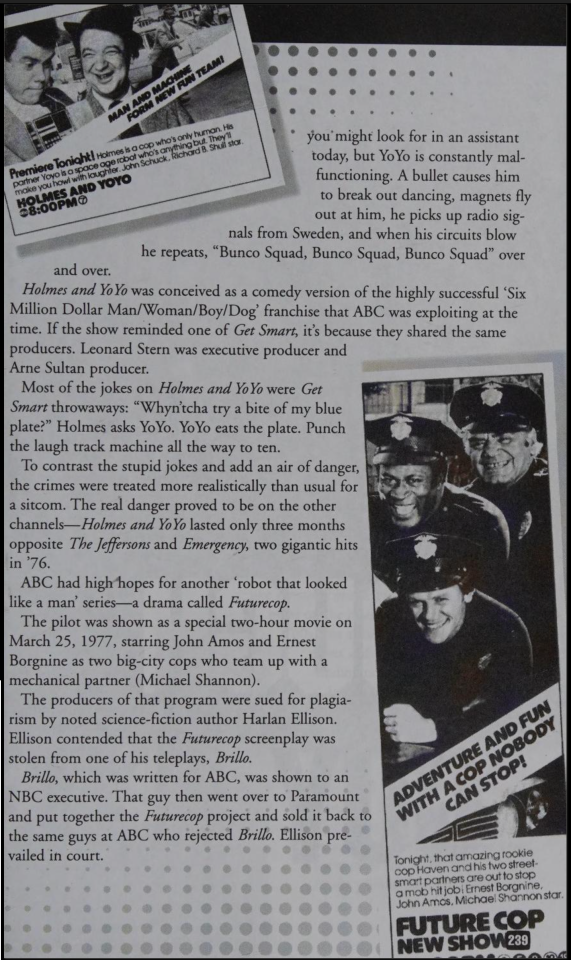
Here's a(n unflattering) description of the show (plus ABC's other android cop show, "Future Cop") from a 1998 book called "TVparty!" by Billy Ingram. I should also add that the author is mistaken about Alex and Yoyo being New York City detectives. The show takes place in California. Here's my previous post about it:
Article Transcript:
Nineteen seventy-six was a very good year for the big three networks. Prime-time commercials were selling at prices 50 percent higher than the year before and were sold out well into 1977. "This season we could sell a test pattern" was the way one network executive put it. And sell test patterns they did.
One of the misguided series foisted on unsuspecting viewers in 1976 was Holmes and YoYo. "To an eight-year-old kid it was cool stuff," one former viewer observed. "It was about a guy with a computer in his chest." Holmes and YoYo (Saturday nights from eight to eight-thirty) followed the misadventures of two New York City police detectives. Unknown to almost everyone, one of the partners happens to be a super-sophisticated robot.
Never was there a more miscast robot in television history. John Shuck (McMillan and Wife) played Gregory "YoYo" Yoyonovich, 427 pounds of police department relay circuits and body armor. He looked more like 220 pounds of doughnut-eating actor. Richard B. Schull [sic] played his partner on the force, Detective Alexander Holmes, Bruce Kirby played Capt. Harry Sedford, and Andrea Howard was Officer Maxine Moon, the girl who swoons after YoYo, never suspecting his secret.
YoYo has the power to eat anything, he possesses a built-in trash compactor that can absorb the shock of a bomb, a photographic memory, an independent power source, and he can print out full-color proofs. Just what you might look for in an assistant today, but YoYo is constantly malfunctioning. A bullet causes him to break out dancing, magnets fly out at him, he picks up radio signals from Sweden, and when his circuits blow he repeats, "Bunco Squad, Bunco Squad, Bunco Squad" over and over.
Holmes and YoYo was conceived as a comedy version of the highly successful 'Six Million Dollar Man/Woman/Boy/Dog' franchise that ABC was exploiting at the time. If the show reminded one of Get Smart, it's because they shared the same producers. Leonard Stern was executive producer and Arne Sultan producer.
Most of the jokes on Holmes and YoYo were Get Smart throwaways: "Whyn'tcha try a bite of my blue plate?" Holmes asks YoYo . YoYo eats the plate. Punch the laugh track machine all the way to ten.
To contrast the stupid jokes and add an air of danger, the crimes were treated more realistically than usual for a sitcom. The real danger proved to be on the other channels���Holmes and YoYo lasted only three months opposite The Jeffersons and Emergency, two gigantic hits in '76.
ABC had high hopes for another 'robot that looked like a man' series—a drama called Futurecop [sic].
The pilot was shown as a special two-hour movie on March 25, 1977, starring John Amos and Ernest Borgnine as two big-city cops who team up with a mechanical partner (Michael Shannon).
The producers of that program were sued for plagiarism by noted science-fiction author Harlan Ellison. Ellison contended that the Futurecop screenplay was stolen from one of his teleplays, Brillo.
Brillo, which was written for ABC, was shown to an NBC executive. That guy then went over to Paramount and put together the Futurecop project and sold it back to the same guys at ABC who rejected Brillo. Ellison prevailed in court.
#holmes and yoyo#holmes & yoyo#1970s tv#70s tv shows#1970s television#70s television#70s tv#1970s#sitcom#retro scifi#scifi comedy#science fiction#scifi#scifi series#scifi tv#obscure media
0 notes
Text
Yes, however there were always other issues at play that caused his Programs to go haywire.
Granted Ma3a was possibly already unstable, but she ended up getting influenced by Tron's integrated code fragments and fCon's... general everything, and her correction algorithms for digitizing humans got mutated into "eradicate digitized humans because everything about them is flawed" - oh hi Clu, is this your long-lost sister.
And Tron's attack on Sam is mostly down to what happened to him because of Clu and his... well. Everything Clu, fixation on Tron and rectification included. Nobody involved saw that one coming, and Alan didn't have any idea what Flynn was doing in the Arcade basement or he'd've gone there well before Sam did.
Thinking along those lines gave me the bones of another fic. You're welcome :)
Alan sits, slumped at his desk. Code swims in front of him on the screen, despite the computer being shut down - he refuses to work on it this late, too wary of messing up something important. Especially when on the other end is a- a life, young and vulnerable and far too trusting in Alan's skills. A living Program, a digital person, not a collection of scripts and algorithms.
Apparently the misadventure during that brief time when fCon had seized control of Encom had not been a stress-induced fever dream after all.
Programs are people. Ma3a nearly killed Jet. Tron nearly killed Sam.
Alan takes a deep breath, and lets it out.
It would be easy to blame the Programs for going wrong and becoming dangerous. Himself for writing them in the first place. Sam and Jet for getting into dangerous situations with no safety net. But-
But none of those are the true problems. They're too easy.
Tron and Ma3a were written because they were needed, and they were - are - excellent at their functions. Alan's still proud of them both - Tron's a marvel of adaptability even now, and Ma3a's calculations are flawless.
Jet was digitized due to a manual laser misfire - someone hit the wrong button, and he was gone. Ma3a hadn't been involved, and even when corrupted she'd risen to the task and kept his son alive. Sam had thought successful human digitization was firmly in the realm of fantasy, had been searching through command terminals to find out what Kevin had been doing right before he disappeared, and only identified the laser and associated commands after he'd already re-input them and been transported. Both of his boys' abrupt plunges into mortal danger, completely unintentional.
And- and neither Tron nor Ma3a had gone wrong without outside interference. Alan isn't sure how free will works with digital beings, exactly, but they'd both been operating under conditions where their free will had been either warped or stripped away entirely. Culpability entirely in question, since if they'd been human Alan has no doubt a halfway decent lawyer could successfully argue diminished capacity.
Ma3a hadn't been... herself. She was never meant to carry Tron's code, but a file restructure had put the drafted upgrades in the same folder as her and the installation scripts had run to... catastrophic results. He'd had to run a full purge on her to get rid of the corruptive remains of what had once been advanced security algorithms. It was a miracle she had functioned at all, confused and in pain and falling back onto directives twisted so far away from what they should have been they were unrecognizable. Her failsafe guidelines, the ultimate betrayal. The poor lass had been inconsolable with guilt and panicking over the what-ifs, not that he'd understood so at the time.
And Tron-
Alan ran a hand down his face, still harrowed by what had happened to his flagship security Program. Everything that made Tron who and what he was, butchered. Brainwashing was the only analogy he had, but even then... not nearly horrific enough a word for what had happened. Tron had been tortured, torn apart, chipped away bit by bit until all he could do was watch. Begging for death as his body hacked his friends to pieces, destroyed innocents he was once designed to protect, puppetted over and over to do things running so counter to who he was as to be anathema to his very core. Freed enough to act only when all but dead, doing his best to take his tormentor with him. Kept alive by a roiling mass of code Alan didn't want to try to comprehend, in limbo long enough to be fished out of it in pieces for Alan to put back together like the world's most disturbing jigsaw.
Tron practically had to be rebuilt from the ground up. Limbs, sensors, armour... so little was that beautiful original script Alan had written decades ago. His core had been salvageable, but at the end nothing else was.
Alan had cradled a gutturing ball of light next to his heart, praying he could work quickly enough to keep that dying flame from going out. Even now, Tron still isn't healed from what he'd been put through.
Jet understands, even if he doesn't want anything to do with computers and games any more. Sam understands, seeking Tron out every time he knows the Program's around to shadow and interact with and generally reassure Tron he hasn't failed entirely.
Flynn had played with lives like it was all some kind of game he could subject to his whims and abandon whenever he wished, assured in being welcomed back with adoration and devotion until explosively informed otherwise. Dillinger and fCon had ripped through a digital world with neither thought nor care for the consequences, hunting Alan's little girl with the kind of focus that made his blood boil. Clu had worn down, stalked, tortured, and broken his eldest son, taking everything he wanted by force and laughing at the wreckage left behind.
And here Alan sat, a formerly unknowing god rudely awakened to the sentience of his creations. Bringing back the dead, now the living's pleas were no longer going unheard. Doing everything he could to make up for what amounted to eons of neglect.
Twenty years outside, a thousand years in. It had been twice that since Tron had sprung to life under his fingertips. Two thousand years, and only now was Tron being given the care he should have had all along. One and a half thousand since Ma3a had tottered to a terminal to send Alan and Jet home, not even knowing if they'd made it back to their world, hearing silence ever since.
Alan was, he decides, a bad father to his digital kids. He's determined to not let that continue.
Starting with bringing as many as he can home.
Tron's got his own room now, a bright blue den full of string lights and paper garlands, with a bed made of more pillows and blankets than logic says should fit and a beautiful view of the morning sun.
Ma3a sleeps on the couch while her room is being finished, but one day soon the riot of greens adorning the walls will be a forest scene to complement the trees across from her window, echoing of bird song, and houseplants on every available surface that isn't her new axolotl's tank.
Lora's on a flight back from Washington, summoned by Alan's admittedly cryptic text telling her the family had grown by several. He checks the time - she'll be taking off soon, probably, if she isn't already in the air. Roy's asleep at this hour, won't wake for anything short of the apocalypse, but Alan's left a message and he'll no doubt be banging on the door come mid-morning.
Bringing Ram, Tron's first friend, back to life was easier than Alan thought it would be. Getting the excitable and wickedly canny Program calm enough to turn that energy on Tron so Alan's kid slept through the night for once? Decidedly less so, but worth it.
Yori is still at Encom for now, but she'll be coming home too once Lora's back and can ensure the digitizing project can be switched off and restarted properly when Yori's not there.
And waiting to finish the last few tweaks and repairs, the first of Tron's kids - Alan's grandkids - to come home resides on Alan's clean-room home computer. Beck has been fixing things in the background and making it run more efficiently, bored but patient and awaiting full use of his legs after being bisected. He and his two siblings will be taking over the new sleepout, painstakingly chosen so all the rooms are the same size.
Sam and Jet come round more often, but they have their own places and Alan's not about to force them to give that independence up.
Alan hums, stretching, getting up so he can shuffle off to bed for a few hours. It won't be nearly enough - he doesn't want to sleep until everyone's under his roof or safely home - but he's not a young man any more.
He's still a Bradley, though. And Bradleys take care of their own.
It just occurred to me that Alan nearly killed both Sam and Jet through his programs. Tron/Rinzler almost got Sam. Ma3a almost got Jet. F in the chat. And sure, it's not directly Alan's fault, but you bet it keeps him up at night, knowing just how close those crazy kids were to dying at his hands. No matter how indirectly.
#tronfic#tronblr#make grim use eir ao3 challenge#good program dad alan bradley#even if he doesn't think so
38 notes
·
View notes
Note
But what misadventures would the computer program Metsubojinrai.net now get into? do they try to mess with Aruto?
@melting-morning-blues
In ref to this past post
Gosh, they would never want to mess around with Aruto in any capacity, other than Fuwa probably. They respect Aruto too much for it and Horobi is still very hesitant to talk to him. Aruto would try to coax Horobi into talking to him and he knows the others are trying their best to help Horobi come outta his shell but Horobi just fucking clams up.
Jin and Ikzauchi speak the most to Aruto and those two travel in his phone like Vice-style so Aruto can show them the world. Sometimes Naki joins in and Horobi only tags along with them if he's convinced. Ika and Jin send Aruto the most memes too.
They all take turns fucking around with Fuwa though, kinda. By that I mean Naki, Jin, and Ikazuchi send him memes and Horobi constantly texts Fuwa, "Have you ate yet? Got sleep? I swear to god if I had my body again all of us are going to come to your house and knock you out so you can get some sleep." and Naki does worry about Fuwa a lot don't get me wrong, but Naki is more so...
"Fuwa Isamu, I know you are staring at your phone and not getting sleep. I am about to shut off your phone and delete all of your data and publish it to the internet if you do not go to sleep right now. Sincerely, Naki."
It's kinda the same to Yua with Jin sending Yua the most memes, Naki, Horobi, and Ikazuchi taking turns to parent her.
#kamen rider zero one#peeps' ponderings#askrikkaiandhyotei#hiden aruto#metsuboujinrai#metsuboujinrai.net#fuwa isamu#yaiba yua#ah yes the mbjr protection squad vs the human rider trio protection squad#unstoppable force vs immovable object
20 notes
·
View notes
Text
About

Name: The Narrator
Nickname: Narry, N-Swoop Narrator, Grandpa, Silver Fox, Daddy Narry
Age: Unknown (Appears to be in his mid-50s)
Height: 5'8"
Pronouns: He/Him
Gender: Computer program
Sexuality: Aromantic Asexual
Occupation: An official guide to Stanley and the occupants of The Office.
HISTORY
Blinking into existence within the compounds of the Parable one day, The Narrator wakes up with one goal that he was sure he needed to do time and time again; telling a story involving about an office worker named Stanley. After countless of mishaps and misadventures together, Stanley finally found a way to escape his hellish office and return to the Real World without him knowing, leaving The Narrator behind.
Without Stanley, the Parable soon starts to decay and crumble, prompting our dear Narrator to become increasingly desperate to get his hands on his next Protagonist. He keeps the Office clean and tidy as much as he could manage, waiting for Stanley to come back. The scent of musty carpet and dust would greet anyone who steps into this strange and isolated dimension.
PERSONALITY
The Narrator is a man who thinks highly of himself. He is arrogant, narcissistic, yet owns an amazing ability to charm others with his ramblings. Even so he is not completely heartless. In rare moments he does show the capability of having a human side if pushed enough. Being a program means it is difficult for him to show any sort of empathy towards others, making him easily disliked. Which is fine, he’s probably not fond of you either.
INTERESTS
Likes: Talking, rambling philosophical takes. Writing stories, teasing Marlise, watching and studying guests in The Office. Looking up pictures of tables. Random night shark facts. Random shrimp facts. Pitting humans against each other. His colorful Hawaiian shirt collection. Interior design, game design, strawberry shortcakes, the stars. Gamers, the good kind. Stanley.
Dislikes: The Skip Button, bad takes on his work, critiques, writer���s block, rude people who show no interest in playing his story out, pests, disobedient, stubborn humans. When things go out of plan. The groan and creaks the Office makes when he’s alone. The dark and the Void Beyond. The rat who keeps eating the cheese off his cheesecakes and leaving only the dry crumbs behind. DotA. Gamers, the bad kind. Stanley.
Ambition: To satiate his boredom by finding a new Stanley and secretly wishes to find a way out of the Parable.
Fears: Being alone, the Office, loss of control, remembering things he shouldn’t.
ABILITIES
Reality-warping:
The Narrator has a massive degree of control over the game-world. He can completely alter the game-worlds to varying degrees and extents. The Narrator can even take control of other game-worlds, such as the ones of Portal and Minecraft.
Plot manipulation:
To the Narrator, the game is but a story he wrote. The Narrator can create entirely new plot elements and can alter the game’s script.
Spatial manipulation:
The Narrator possesses advanced ubicokinetic talents, having complete control over the game’s space. Examples of this power include re-arranging, creating and modifying rooms, adding or removing doors, and creating infinite loops in space, such as in the Mariella Ending.
Nigh-omnipresence:
The Narrator is seemingly almost everywhere at once, seeing everything Stanley does. However, he is not truly everywhere, whenever and nowhere, as seen in the Escape Pod Ending where the escape pod requires the Narrator’s
9 notes
·
View notes
Text
"Now... take me to the horizon!" (Captain Jack Sparrow) Alrighty! After a long debate and some unfortunate blogging experiences, I'm attempting to build my own little online diary dedicated to my passion, art and creativity! I'm a soon-to-be 36 years old Italian dreamer who loves art, comic books, animation, books and writing! My mind world is chaotic as can be (thank you ADHD), but there's always some highlights that stand out and I'm looking forward to share those! A new artistic technique learned? A new picture that I'm proud of? Just some random sketches? Playing with video programs? Trying to bring my two written projects (a graphic novel and a thriller) home successfully? Rants about my computer misadventures? Who knows what lays ahead!
2 notes
·
View notes
Text
I know "which programming language is best" is largely a matter of taste, but holy shit is Python bad for anything other than outlining simple algorithms in a pseudocode-like manner for teaching purposes.
All of the important underlying type information is abstracted away in favour of simplicity, which just means that when you want to interact with it, as you have to when you are doing anything substantial, you have to stuff in clunky syntactic garbage functions in order to retrieve it anyway, which just makes the resulting code less readable than it would have been in the first place.
Because type information is abstracted away, IDE tooltips always fucking suck.
The language disdains object oriented programming, despite the fact that nearly all modern programming is object oriented. Every bit of syntax to declare object properties feels like a hack. Access modifiers are not exposed and you have to add them in your function names??? You can't declare members in the class body and have to instead add them dynamically in the constructor???????? The object "self" must be explicitly passed to class functions as a parameter??????????????????? Those are all so hilariously bad and unintuitive that even though I know I've checked this I feel like I must be missing something, how was that chosen to be the intended behaviour!!!
It's an interpreted language. Why have we made an interpreted language the norm for data science applications, whyyyyyyy. Not to mention that means that you have to declare functions before you can run them like aaaaaaaa what is this the 1960s where we are feeding programs in via punch cards.
The entire Python experiment was a colossal misadventure. Because it is more human-readable when you are just demonstrating simple algorithms it is an easy language to introduce as a "first programming language" in entry compsci classes, as stuff like typing is abstracted away (I honestly feel that teaching programming like this is actively counterproductive to creating understanding, but whatever).
Anyway, so it got taught first, which unfortunately meant that people learning to program got used to it and started using it for actual applications, and now we are stuck with shitty Python abstractions and paradigms as the default for a lot of people and it has become one of the most popular languages on Earth, even though literally any other programming language will be much more well suited to the purpose of actually programming computers and will be more efficient. Now you have to know and use Python in order to do any actual industry work as a programmer, aaaaaa.
We literally have C# which is practically perfect for both imperative and functional programming and has a mass of libraries and can be compiled to standard executables and yet in order to write any ML code I have to create socket bridges to a live Python script because all of the libraries for data science were written for Python because data science people don't know how to use anything else and the .NET ports suck and are not up to date, aaaaaaaaaaaaa.
The proliferation of Python as a serious programming language and its consequences has been disastrous for humanity.
76 notes
·
View notes
Text
BLOGTOBER 10/20/2020: PULSE aka KAIRO (2001)

There's a moment in Kiyoshi Kurosawa's PULSE (aka KAIRO) in which two college students stand before a computer screen, watching a program that consists of softly glowing white dots drifting across a black void. One explains to the other that this is a computer science project in which dots that make contact are destroyed, but dots that grow too far apart will be drawn back together. This is an explicit metaphor for our ambivalent modern existence, in which internet-driven isolation becomes increasingly unbearable, but intimacy seems impossible, and even somehow perilous. This is PULSE's thesis statement, which it explores by proposing that when there is no more room in hell, the dead will come online--a breach of natural reality that dissolves the crucially meaningful line between life and death, with apocalyptic consequences.
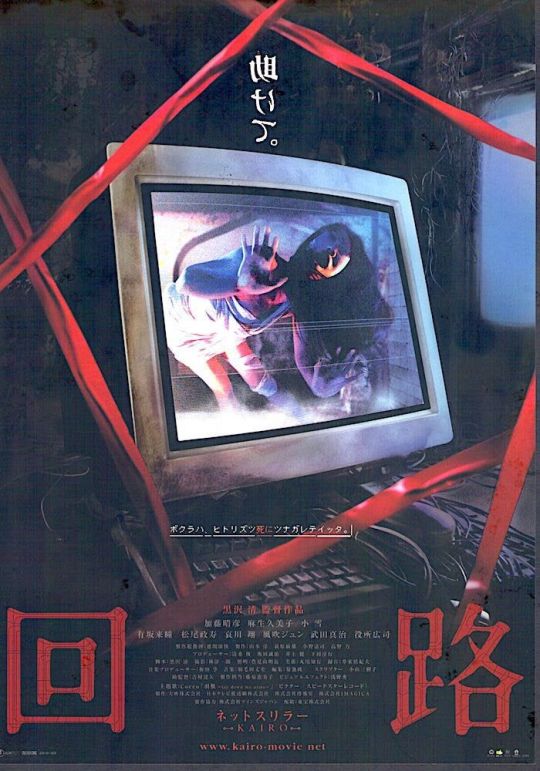
In accordance with its obvious themes, Kurosawa's enormously creepy thriller about modern alienation--a release that was perfectly timed for the dawn of the new millennium in 2001--features a cast of disparate characters who struggle to connect with one another as they each grapple with the supernatural disaster that slowly bleeds from their computer screens into the physical world. At the start, a group of coworkers discover that their friend Taguchi (Kenji Mizuhashi), who has fallen out of touch while obsessively working on a computer program for them, has committed suicide. That's putting it simply; actually, when Taguchi lets his concerned friend Michi (Kumiko Aso) into his apartment to retrieve the disc, he casually hangs himself in another room. The sequence is beyond chilling, and it's relevant for me to admit that when Michi first encounters Taguchi, I couldn't be sure whether she was talking to him, or his ghost. As the group investigates Taguchi's fate, they are each contacted by spirits from the other side, which causes the living to begin to fade from existence; first they lose their will to live, then they lose their rational minds, and ultimately, they lose corporeality. Meanwhile, young luddite Ryosuke (Haruhiko Kato) installs the internet at his home for the first time, and immediately, something starts logging on independently, sending him upsetting images of people haunting their own darkened apartments. Terrified, he enlists the help of computer science student Harue (Koyuki), and together they come to the appalling realization that the dead are returning to Earth through the internet, as the living drift senselessly away.
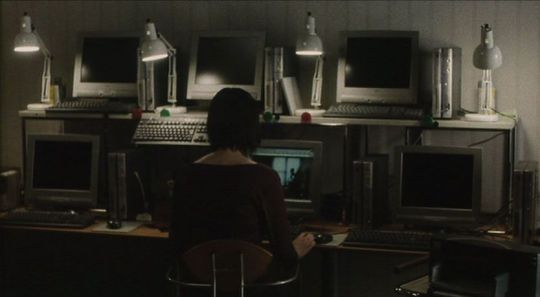
There is so much rhetoric about the alienating powers of the internet now, that it's hard to discuss the subject without feeling like you're just cycling through clichés cooked up by an older, future-phobic generation. PULSE avoids this pitfall by remaining stubbornly abstract. When the living encounter the dead, after the invariably horrifying moment of contact, the live victim first experiences a profound lethargy, indicative of an ever-deepening depression; we understand that while the fear of the returned dead is the most immediate concern, the shattering of definitions that this causes is what catalyzes the victim's transformation from quivering flesh to a moldering stain that eventually flakes away and vanishes. Seeing the end of the world closing in, Harue observes that if the dead are forced to continue to suffer the maddening monotony of their mortal lives, then what distinguishes a person from a ghost? As life and death meld into a homogenous mass, our dwindling protagonists search for answers, trying to dismantle the mysterious images and phone messages sent from the afterlife, but they only succeed at making themselves more painfully aware of the inevitable. The audience experiences the hopelessness of this misadventure along with the heroes, unable to make any satisfyingly concrete meaning out of the bizarre phenomenon that is taking over the planet. It seems that life is made worth living by the contrast between things, and the expectation of change and evolution--even the simple daily change of being able to leave one’s apartment, and commune with others. When these possibilities are eliminated, and the disembodying effect of the digital world takes hold, life essentially becomes a version of hell.

Western audiences (of which you are probably a part, like me, if you are reading this) tend to balk at anything they can't fully understand, as if a film were a like a jigsaw puzzle with many pieces forming a rational whole, each piece having its own tidy function. As he often does, Kurosawa defies that longing for clarity and completion, and he gets away with it by building up an intensifying terror that feeds on our lack of understanding. Without a set of rules to live by--without a silver bullet, a wooden stake, or a detailed backstory--we are left with nothing to defend us against the appalling idea of the void gazing back at us, and ultimately absorbing us. Some characters in PULSE discover that they can seal the ghosts behind a door or window using red construction tape, but this doesn't always work, as an unfortunate young man finds out when he spots a frantic mass of tape plastered all over a solid wall, only to find the movie's most dreadful specter approaching him from behind. As far as one knows, there is no salvation to be found anywhere.
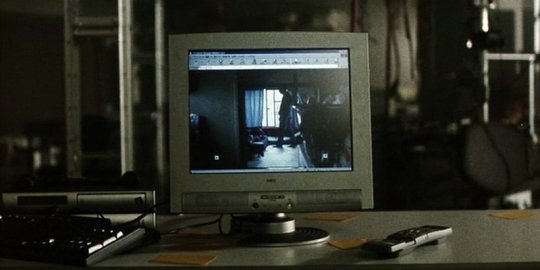
While preparing for this review, and trying to figure out how I was going to avoid the embarrassment of repeating the usual nonsense about how the internet desocializes you and rots your brain, I read an excellent review of PULSE by Washington Post critic Stephen Hunter. He observes wisely, "Pulse is best enjoyed if it's not questioned too closely. It lives visually in a way it cannot live intellectually". The truth is, I think movie viewers would benefit from this attitude in general, remembering that no movie participates in our quantum reality; they are only windows to various emotional states, demonstrations of different ways to process and cope with experiences that we can rarely fully understand and control even in "real life". PULSE provides a near-perfect description of our collective loss of control in the face of unstoppable digital assimilation. And much like the movie itself, I have no comforting conclusion to offer.
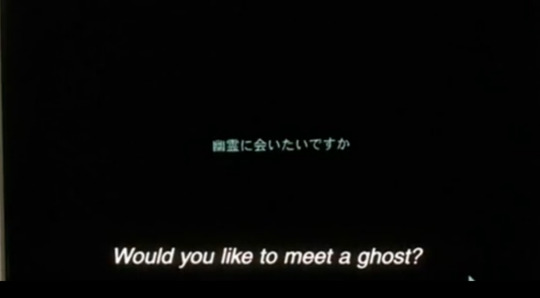
#blogtober#2020#pulse#2001#pulse 2001#kairo#kiyoshi kurosawa#kumiko aso#haruhiko kato#koyuki#kurume arisaka#masatoshi matsuo#shinji takeda#jun fubuki#shun sugata#koji yakusho#show aikawa#kenji mizuhashi#horror#thriller#sci-fi#internet scare#supernatural#ghost
165 notes
·
View notes
Photo

Roderick, or The Education of a Young Machine. John Sladek. London, Toronto, Sydney, New York: Granada, [1980]. First edition. Original dust jacket.
The title character is an intelligent robot, the first to be invented. The opening chapters describe the creation of Roderick and show his mind (at first consisting of a bodiless computer program) developing through several stages of awareness. Finally, Roderick is given a rudimentary body and, through a series of misadventures, finds himself alone in the world. Due to his sketchy understanding of human customs, and intrigues surrounding the project that created him, he unwittingly becomes the center of various criminal schemes and other unfortunate events.
10 notes
·
View notes
Text
I have to fudge details to reconcile the two - and yes, there are fanfics about this.
The Lora-Ma3a issue: I keep Lora's accident, but I downgrade it from fatality to injury. The kind of injury that leaves lifelong effects. Really, it's because she could kinda be re-compiled, but the process wasn't perfect.
Who Flynn told? Well, Flynn told Alan and Roy, but he was more than a bit intoxicated at the time (calling them by their Programs' names by accident and backpedaling by treating it like a nickname), and Alan didn't really buy the fantastic story about worlds inside the machine. He figured Flynn was a little more buzzed than he actually was. It was only after getting in and the misadventure with Jet that showed that Flynn wasn't speaking in metaphor or rambling.
The correction algorithms - When Master Control crashed, it took the whole batch of correction algorithms with it...but Flynn had already been uploaded. His pattern was cached! That meant that he was the only one would could go in and out without ending up like Thorne.
The Grid was designed, in part, to rebuild those algorithms, so others could see this new world. It was faster to do that building from inside, and the Isos definitely put in a lot of input. The Isos were also the result of Flynn testing the laser on organic matter; mostly things salvaged from the arcade trash can. The organic sludge that resulted wound up in the Simulation Sea, and the combination of junk code and human DNA fused into Isos.
Flynn had just cracked the algorithms in 1989 and was about to do the final test. Clu realized it was now or never to put a stop to Flynn and launched the coup. Clu had some "friends on the other side" with Fcon. Flynn's phone line to the pager meant the Grid was almost, but not entirely isolated.
Fcon agents stole the computer and notes that Flynn kept in his apartment after Flynn was declared missing on Clu's information.
After the Fcon incident with Jet, Alan's brain and scheming went into overdrive. He now had the last piece of the puzzle and was convinced that Flynn had been to that world and got trapped. But he also wanted to let Sam know. Then the pager went off and that confirmed it.
Alan waited for after the yearly stunt to approach Sam. He was going to need help and the plan was to go to the arcade together and investigate. But Sam...well, Sam jumped the proverbial gun.
One of the exercises my pattern recognition loves, for some reason, is to take widely accepted ideas in fandom, things that are basically considered obvious from canon, and figure out ways that the truth could actually be something else.
This is an obnoxious thing to do, sometimes.
I get annoyed at my pattern recognition routines for this.
Especially when I don't even have any particular reason to want the new interpretation.
And especially when (like a lot of my sudden weird inspirations) it happens in the middle of the night.
----
But it is difficult to fight against.
Because whenever there is "proof" that something isn't true in canon, a creative enough mind will find ways around it.
If the proof is "no character ever mentioned that, and they would have mentioned it if it were true"…. all it takes is a plausible reason for someone to keep something secret, or even just not to bring it up in a particular context.
If the proof is "a character literally SAID that was not true"… likewise, all it takes is a plausible reason for someone to lie.
If the proof is "it involves a character who is dead in canon," we just need a reason why the character is believed to be dead but is actually not. (This is especially feasible in canons where there is a potential in-universe mechanism for someone to be copied, resurrected, etc.)
If the proof is "we saw something happen onscreen that is extremely incompatible with the new interpretation," then there's always the possibility of that onscreen event being some type of illusion (especially in canons with magic or technology that make that very feasible).
And I am especially irritated with my Recognizer… (I think that's what I'm going to call it from now on-- Recognizer, an annoying little Pattern Recognizer that buzzes around my head like a tireless insect, looking for puzzles to solve that absolutely nobody needs solved)…
…for becoming fixated, lately, on the question:
What is it, exactly, that makes TRON 2.0 incompatible with Legacy?
(Thank goodness the Recognizer isn't trying to take the comics into account… yet, at least. If I had to watch it try to reconcile Betrayal and Ghost in the Machine with the other canon and with each other, I'd probably eat my computer.)
Anyway. So far I've got:
The structure of ENCOM. I need to look more closely through all those emails from 2.0… they show the power balance of the company changing in ways that seem to diverge from what we see at the beginning of Legacy. (At least Flynn seems to have disappeared in both? Though the times may not line up.)
However, I imagine a lot could change at ENCOM between 2003 and 2010. And we have to remember that not everything said in every email has to be true. Some might even be spoofed emails, sent by FCon for whatever deceptive reasons they might have. We can theoretically disregard any 2.0 canon that comes from the contents of an email, if we can explain it on those grounds.
Alan's family. In 2.0, Lora is apparently dead from a digitization accident, and she and Alan have a son. Neither of these were mentioned in Legacy (although lack of mention isn't proof in itself). Also I believe Lora appears, alive, in some of the supplemental Legacy material.
Going from what I saw of the game's plot, we could imagine that Lora was somehow recovered, later on, from the data that became Ma3a. (If I recall correctly she was eaten by a Seeker? But that doesn't necessarily mean destroyed?) Anyway, if enough of her ended up being recoverable, she could theoretically have been found and rerezzed back into the User world, sometime between then and the events of Legacy.
And, of course, possibly the biggest obstacle: In 2.0, Alan is aware of the world inside the computer.
He got digitized in there as part of FCon's sabotage attempt. It appears (though it doesn't seem absolutely certain?) that this was the first time he'd been digitized into the computer, or even knew it was possible. But after the events of 2.0 he definitely knows about it.
If Alan knew this could happen, it would be… challenging, at the least, to explain a lot of how he acted in Legacy.
---
(And this line of speculation, I think, is really what my Recognizer is focusing on.
See, I don't think it even cares all that much about reconciling 2.0 into the canon. I think it mainly just wants to believe there were some early days when Flynn and Alan and Lora and Roy had fun together exploring the world inside Encom and meeting their programs.
If it were a rational being, it would just make up an AU for this.
But it is not a rational being. It's a deranged pattern recognition subroutine, and its entire obnoxious goal in life is to find or force connections between things, until it can figure out a way everything makes SENSE together.
Sometimes the most nonsensical thing you can possibly do is try to make everything make sense, Recognizer.)
---
First issue: If he knew that people could be digitized into computers, why did Alan not find out what had happened to Flynn?
Well… maybe he did know. Or had good reason to suspect. After all, someone's been paying the electric bill at that arcade to keep the computer running all these years.
If so, though-- why had Alan not tried to get Flynn out of there?
Maybe Flynn had specifically requested for him not to, not unless he paged asking for help.
Or: maybe Alan had tried. Maybe he'd even gone in! Maybe he barely made it back out with his life, without even being able to confirm Flynn was in there somewhere. Maybe he looked through the code trying to fix things from the outside, but realized there was no totally safe way to extract Flynn at this point or even identify him for sure.
Or: Maybe he did extract Flynn from there, time after time. Maybe Flynn kept going back in, and getting his stupid ass in trouble again and again. And the more it conflicted with his job, and the more stress it put on Alan… the more Alan decided, I am too damn old for this, this is a job for someone young and crazy and reckless like Sam, but even Sam is gonna have to wait until Flynn actually admits he needs help and actually pages me asking for it, the stubborn idiot.
In any of these scenarios, though, there's the further question: why did Alan not tell Sam more about what he was getting into?
And there, again, we can only speculate:
Maybe Alan reasoned that Sam has had many years to file away his dad's old stories firmly under the heading of "made-up tall tales," and if he told Sam the whole truth, Sam would refuse to believe it and just be angry.
This may or may not be actually true about Sam… but if Alan thought it, he may have refrained from telling him to increase the chance Sam would actually take on the task.
In any case, Alan sending Sam in there is… an ethically questionable decision at best.
Hell, even if Alan didn't know about the world inside the computer, sending Sam in was a questionable decision. He didn't know what would be waiting there at the arcade for whoever answered the page, and for all he knew it could be something dangerous. For all he knew, whoever answered the page could be walking into some hostage situation, with the mafia holding Flynn captive and demanding company secrets or something.
But… I can see his reasoning, even if I side-eye its ethics a bit.
Whatever he knows or doesn't know about the computer system, Alan knows he's not cut out to handle danger nearly as well as Sam is.
And he knows Sam, of all people, would want the closure of doing this, finding out Dad's secrets on his own.
And, if Alan knew something about those secrets already-- that even explains why he kept this solely between himself and Sam, instead of involving anyone else who might be better equipped than either of them to handle ordinary, real-world dangers.
But… all this notwithstanding, there are probably still some hangups for my Recognizer to deal with.
The one it's gotten stuck on now-- perhaps even stuck enough to let me go back to sleep-- is in the Next Day short.
Specifically, the very end, when Alan and Roy are alone together.
Everything up to that, the Recognizer can disregard any statements it doesn't like, because they could have been lies or omissions for the benefit of the public.
But assuming Roy and Alan both have been inside the computer-- as the Recognizer stubbornly wants to believe-- they don't have any reason to lie about it to each other.
So Roy's very last line-- "Why do you think Flynn gave you the cool nickname?" makes no sense, if they've both met their programs and know they were named after them.
But honestly… nothing about that last line makes sense, in any interpretation.
Namely:
Even if they hadn't ever met their programs as living personifications, they know they wrote their programs... and presumably Roy's program was also named Ram outside the system.
Alan (from the earlier interviews in the short) clearly knows he was nicknamed after the program he wrote, so I can't see why Roy wouldn't already know the same.
Ram is an obviously cooler nickname than Tron.
So…. shut up, Recognizer.
Stay stuck.
For now, at least.
18 notes
·
View notes
Text
20 Years of Mazeguy Smilies, 35 Years of Pixel Art
It's been twenty years since I first shared my smilies with the world! To celebrate the occasion, I made this collage:

Coincidentally, this year also means I've been making pixel art for about 35 years. I've written an article about my journey which you can read here, but I'll recap a few highlights:
1986: Dazzle Draw
The reason Mazeguy Smilies exists is probably due to Dazzle Draw, a painting program released by Broderbund Software in 1985. My family had an Apple IIe computer at the time, and I believe we bought Dazzle Draw the following year. I was eight years old at the time.

Back in those days, I didn't have a Wacom tablet, and drawing freehand was difficult. I figured out that the best way to create the curved lines and details I wanted was to zoom in and draw one dot at a time. Unbeknownst to me at the time, I was learning the basics of what would later be called "pixel art". Today, I create smilies using the exact same technique.
My siblings and I had a lot of fun with Dazzle Draw, filling fifteen floppy disks (the ones that actually WERE floppy) with over 100 paintings. Unfortunately, only one has survived to this day. This portrait of Bowser was converted to black and white, and printed in my junior high school's newspaper.

1992: Mario Paint
My next drawing program was Mario Paint for the Super Nintendo. I loved the fact that you could combine art, animation and music to create multimedia. I still have my copy of Nintendo's Official Mario Paint Player's Guide, even though it's quite worn out from reproducing video game sprites and songs.

Mario Paint included several "stamps", small pictures you that could paste onto the canvas or use as a paintbrush. A Stamp Editor tool let you edit existing stamps or design new ones on a large, 16x16 grid. Sound familiar? Thanks to Mario Paint, my pixel art skills were refined a little further.
So, what kind of videos did I make using Mario Paint? Well... Um... Stuff like this...
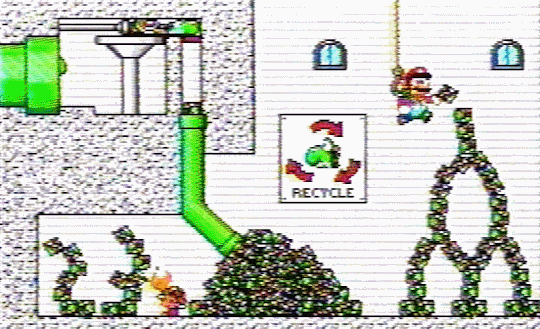
1994: Game-Maker
Game-Maker was developed by Recreational Software Designs. It's a collection of design tools that allows users to create their own DOS games. To test out the software, I made a simple game in which a guy tries to get through a maze. Yes, this is where "mazeguy" came from. Somehow, it became my nickname, then the name of my website.

Mazeguy grew in complexity, and eventually morphed into Invasion of the Blobs, which later got a sequel. Both games required drawing and animating backgrounds, enemies, and heroes. Title cards, level intros, and cutscenes were also illustrated pixel by pixel.
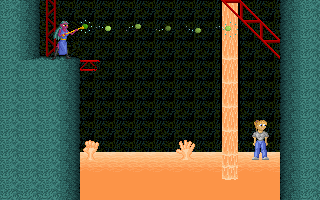
2001: Flash Kit and Tripod
At the beginning of the new millennium, I started using Flash for the first time. I needed help learning how accomplish certain tasks, and discovered many helpful tutorials at FlashKit.com. I joined the forums, and found a thread titled "Smiley Award Winners". A user named ThundaChunk, a.k.a. JohnnySix, was awarding a small banner to the best smilies submitted in an earlier thread.

It was too late for me to participate, but after fifteen years of creating pixel art, the idea of making smilies intrigued me. I made a whole bunch and put them on my Tripod website. While I was having fun seeing how many emoticons I could come up with, I was also secretly hoping that another smiley contest would be held in the future, and I'd get my own Smiley Award.
Then, on March 29th, 2001, The all new FK members smiley thread appeared. I quickly posted a link to my collection. And so, after a little prodding, I got my Smiley Award.

Over the next two years, my website would get more traffic, and suggestions from visitors helped make my smiley collection grow. Both of these factors caused the site to routinely go over Tripod's bandwidth limit. My free web hosting service was no longer sufficient, so I registered Mazeguy.net on October 25th, 2003.
2005: Hoagie's Revenge
My brother and some of his friends formed a film group, and they needed an animator for one of their short films. It's about a man challenged by his roommate to complete a brutally difficult video game. My job was to build an original Nintendo game that is so unfair, so impossible to beat, that the programmers didn't even bother creating a second level.
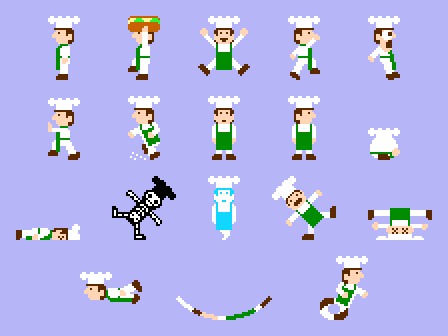
You can read more about Hoagie's Revenge, the game within the movie, as well as complete sprite sheets here.
2013: Wordlock
Fifteen years after completing Invasion of the Blobs 2, I revistited Game-Maker and made a puzzle game containing 100 riddles. The graphics weren't particularly complex, but I think the sci-fi font I designed was pretty neat.
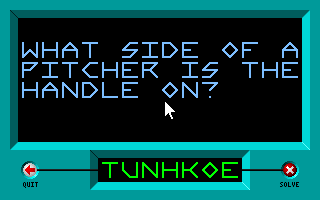
You can learn more about Wordlock and how to play it here.
2021: What's Next?
The introduction of emoji have pretty much made smilies obsolete. One avenue that might be worth pursuing is Twitch Emotes, but I've kind of moved away from creating pixel icons.
These days I spend most of my time working on my webcomic, Chuck's Devils. Sometimes I depict the main characters in pixel form, as seen here:
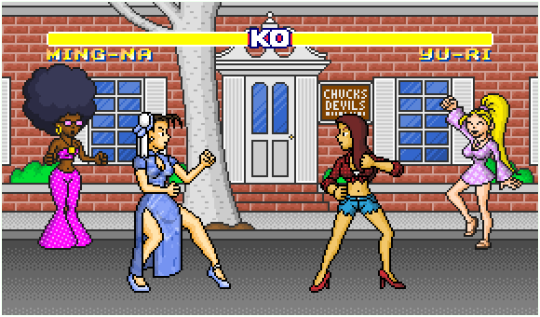

While the series is nowhere near as popular as my smilies were, or even my domino toppling videos (which is a story for another day), I like the process of creating wacky misadventures for Candace, Yu-Ri, and Lily. I hope you'll check out the comic and follow along. :)
5 notes
·
View notes